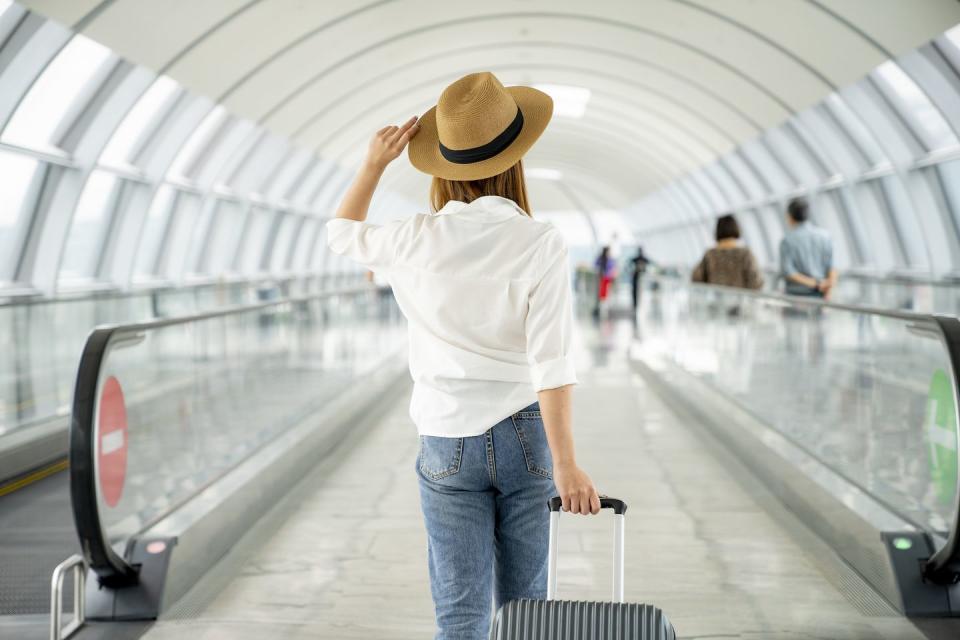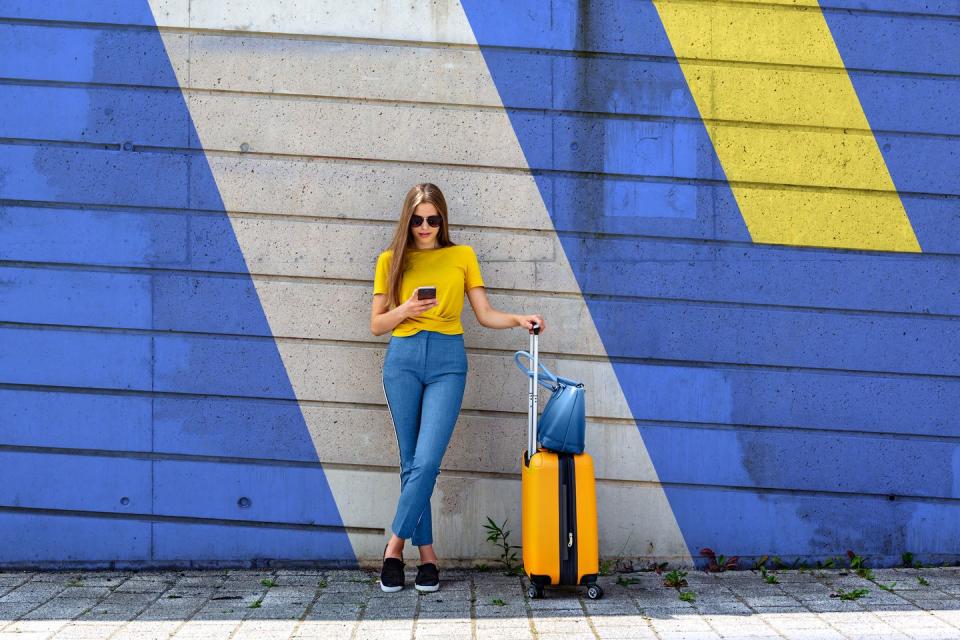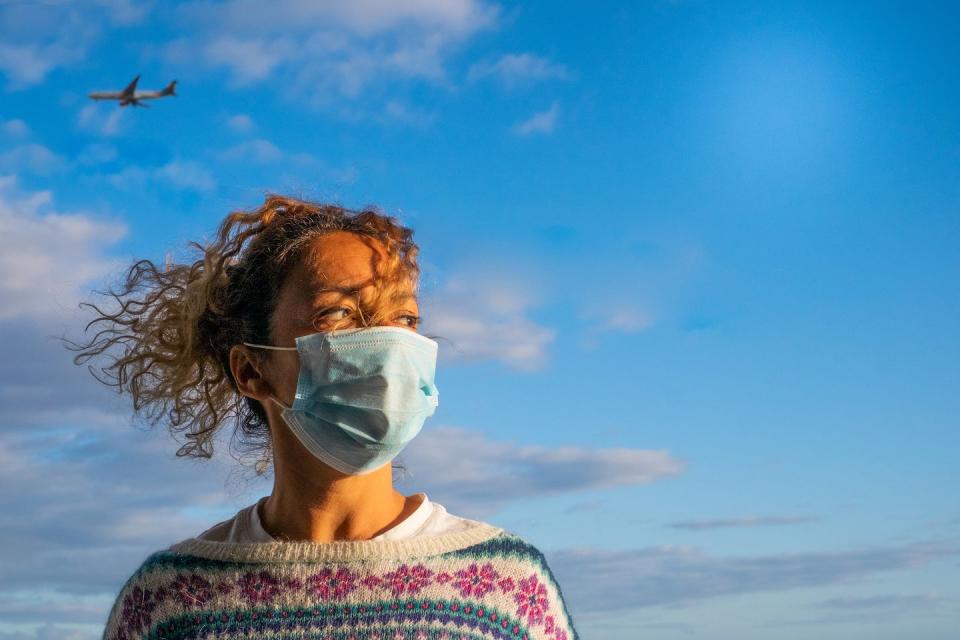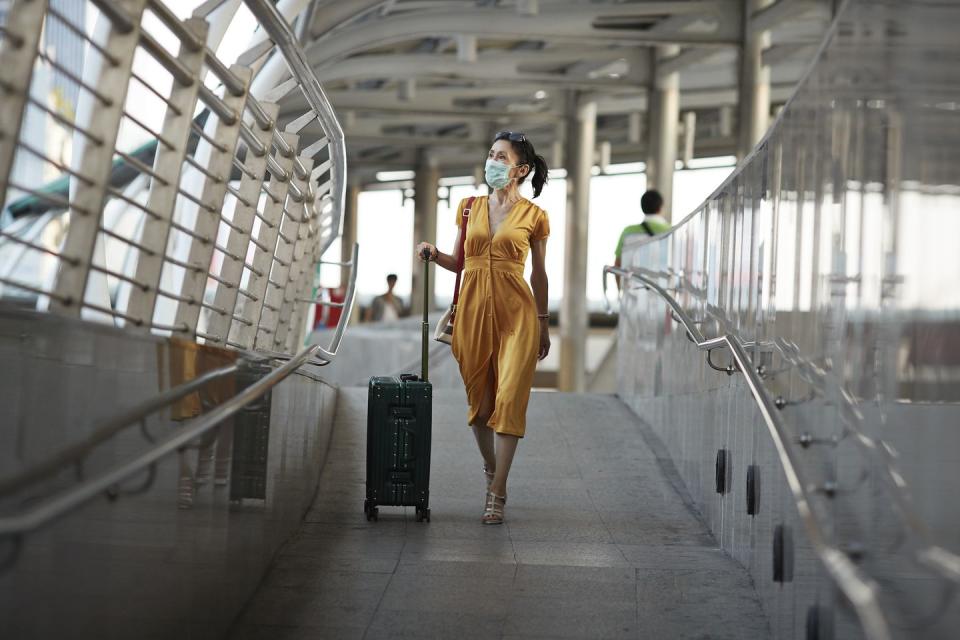When Can I Go On Holiday In The UK And Abroad?

We will continue to update this article as more information comes in.
Holidays have long sounded like a distant memory, much like Sunday afternoons spent in the pub or hearing the thrum of chatter at the hairdresser’s during the ongoing Coronavirus pandemic.
However, with the UK government enforcing a national Tier 5 lockdown at the start of 2021, dreams of basking in the sunshine on a beach in the Côte d'Azur and eating tapas in a Barcelona taverna this year were increasingly becoming less of a reality. Or, so we thought.
After weeks of speculation regarding the restrictions we'd face in the UK as we headed into a near year, on January 5 Prime Minister Boris Johnson announced that from January 6 people were to stay at home, other than for limited exceptions, with measures expected to last until at least mid-February.
‘The weeks ahead will be the hardest yet but I really do believe that we are entering the last phase of the struggle,’ he told the British public via a televised address.
As for travel, those who need to must 'stay local – meaning avoiding travelling outside of your village, town or the part of a city where you live', which pretty much wrote off any plans for a weekend abroad or half-term holiday.

At present, the government states that 'you can only travel internationally – or within the UK – where you first have a legally permitted reason to leave home'.
However, on Monday February 22, Prime Minister Boris Johnson announced that a new lockdown roadmap will come into force which will mean the gradual easing of restrictions at the start of March and the possibility of holidays.
We've rounded up the latest information on travel outside of the UK, including rules on essential travel, quarantine, insurance and flights.
When will people be able to go on holiday?
Following Johnson's Commons address on February 22, it's now understood that the current 'stay at home' rule for those in England will ease and be replaced with advice to 'stay local' from March 29.
'People should continue to minimise travel wherever possible,' the government notes, however it is yet to specify how 'local' is local.
As for Northern Ireland, lockdown rules will continue until April 1 and Scotland is expected to ease some restrictions in March.
For those wanting to go oversees, abroad holidays will not be permitted until at least May 17, according to Johnson. International holidays will be eased depending on a review on April 12, led by Transport Secretary Grant Shapps.

Following Johnson's February 22 announcement, the BBC reported the UK's biggest holiday operator, Tui, said bookings jumped 500% overnight with Greece, Spain and Turkey coming out on top as the most-booked destinations. Meanwhile, EasyJet reported a 337% surge in flight bookings and a 630% jump in holiday bookings for locations such as Alicante, Malaga, Palmo, Faro and Crete, per the news outlet's reporting.
In Johnson's January 2021 address, he outlined what Britons could expect from their holidays during the current nationwide lockdown.
At present, the public are urged to avoid travel unless they have a reasonable excuse (listed here) and if they do need to travel oversees (eg are legally permitted to do so, for example, due to work obligations), 'even if you are returning to a place you’ve visited before, you should look at the rules in place at your destination and the Foreign, Commonwealth and Development Office (FCDO) travel advice'.

'UK residents currently abroad do not need to return home immediately. However, you should check with your airline or travel operator on arrangements for returning,' it adds.
What are the current coronavirus travel restrictions?
Following months of quarantine rulings in place, reducing from 14 days to 5 as recent as December, the government updated information with regards to self-isolation and travel corridors.
On January 8, the government announced that passengers arriving from all international destinations will be required to present a negative Covid-19 test result 'before departing for England to help protect against new strains of coronavirus circulating internationally'.
It continued, explaining:
Transport Secretary Grant Shapps has announced that from next week inbound passengers arriving by boat, plane or train will have to take a test up to 72 hours before departing the country they are in, to help protect against the new strains of coronavirus such as those seen in Denmark and South Africa.
Pre-departure testing will protect travel and will provide an additional layer of safety from imported cases of coronavirus on top of the mandatory 10 day self-isolation for arrivals, helping identify people who may currently be infectious and preventing them from travelling to England.

Shapps added in a statement about the new testing measures: 'Taken together with the existing mandatory self-isolation period for passengers returning from high-risk countries, pre-departure tests will provide a further line of defence - helping us control the virus as we roll out the vaccine at pace over the coming weeks.'
All travellers on arrival in the UK from all countries, territories and regions must complete an online passenger locator form at the UK border. Failure to complete the form is a criminal offence.
The .Gov website states: 'You can complete it any time in the 48 hour period before you are due to arrive in the UK. Make sure you leave yourself enough time to complete it. If you do not complete the form before you arrive in the UK, it might take you longer to enter the UK.'
All travellers will then be required to self-isolate at home for ten days. They will also need to take a Covid test on the second and eighth days of their self-isolation, costing £210. Tests can be booked here.
However, those travelling on domestic flights and arriving from Ireland, the Isle of Man or the Channel Islands don’t have to complete the form (as well as a small number of people due to the jobs they do.
Who will need to stay at a quarantine hotel?
A mandatory 10-day quarantine in a Government-approved hotel is mandatory for those arriving into England from 33 countries, listed here. The rate for one adult in one room for 10 days (11 nights) costs £1,750. More information can be found here.
'If you have not arranged a quarantine package prior to your arrival in England, you face a penalty of up to £4,000 and will still have to pay for your quarantine package on arrival,' the government website notes.
What is an ‘travel corridor’ and how does it work?
An air bridge – otherwise known as a ‘travel corridor’ – is a way of allowing travellers from two countries to travel between the destinations without having to quarantine the previous two-weeks on arrival in either direction.
Shapps previously explained that the bridges would ‘enable people from other areas who have themselves achieved lower levels of growth virus infection to come into the country’.

In 2020, several scientists warned that a second wave of Coronavirus was a real threat and advised travellers to heed the government’s advice when it came to booking trips abroad in 2020 and beyond.
David Hunter, a professor of epidemiology at Oxford University, told the Metro: 'If you went on vacation to a country thought to be low risk, but while you’re there, there’s a massive outbreak, would you now be handled differently? You probably should be.
‘If the countries agree and the rules are clear and the contingencies are clear, then at least people know what they could be in for, whereas if it’s all vague then it’s a bigger risk.’
Do you have to self-isolate on return to the UK?
Those who have visited anywhere not on the travel exemption list and arrive in the UK must self-isolate. The regulations state that you must self-isolate for 10 days on arrival in the UK, whether you're a UK resident or simply a visitor to the UK.
Permitted travellers will need to take a Covid-19 test up to 72 hours before departure, 'and this will apply irrespective of whether a country is on the travel corridor list'.
The guidelines outline the following:
Passengers arriving into England who have successfully demonstrated a negative result prior to departure from a country not on the travel corridor list will still have the option to reduce the self-isolation period from 10 to as little as 5 days by paying for a test through the Test to Release scheme. The scheme requires a test to be taken on or after the fifth full day since leaving a country not on the travel corridor list.
Passengers will be required to show their negative test result before boarding, and transport operators will deny boarding if necessary. On arrival back into the UK, Border Force will check passengers test results through the current spot check regime, to ensure that individuals are compliant with the new rules, and passengers will be subject to an immediate fine of £500.

When planning holidays or overseas travel, the government advises individuals to check the latest FCO travel advice on GOV.UK, ‘including whether there are any self-isolation measures in place for their outbound or return journey’.
What is a 'transit stop'?
This is stop where passengers can get on or off and can apply to coaches, ferries, trains or flights. Your travel ticket should show if a stop is a transit stop (think connecting flights).
Remember, though, that if your journey involves a transit stop in a country, territory or region not on the travel corridor list, you'll need to self-isolate on arrival in England if:
new passengers get on
you or other passengers get off the transport you are on and mix with other people, then get on again
More information on transit stops can be found here.
How safe is flying during the coronavirus pandemic?
While there is still a lot of research that needs to be conducted into the spread of the virus on aeroplanes, there have been reported cases involving passengers transmitting the virus to others, in the media.

In addition, previous research has shown that viruses including SARS, influenza and smallpox have spread on aircrafts.
According to the NHS, the virus can be spread when respiratory droplets carrying infectious pathogens ‘travel directly from the respiratory tract of an infectious individual to susceptible mucosal surfaces of a recipient, generally over short distances.
'This can be in the form of sneezing, coughing or speaking.'
In recent month, several airlines have implemented new measures to try to mitigate risks of infection during travel which have included leaving space between passengers empty. Meanwhile, London’s Heathrow airport made it compulsory for all passengers and staff to wear face masks. Hand sanitiser is also available at over 600 kiosks throughout the airport and temperature screening is being tested.

But if you’re planning on hopping on a flight to a European country, you might want to keep hold of your purse for a while longer, the BBC suggests.
Last June, Jet2 and Eurostar announced that they plan to cancel some summer flights and trains in 2020 and 2021 due to the health crisis, meaning that many locations might still be out of bounds.
Boarding protocols, restrictions on on-board toilets and rules regarding face masks vary between airlines so it is important to consult rules prior to travel.
You can find a very useful list of travel bans, restrictions and flight plans on Skyscanner here.
What precautions should I take while travelling during Covid-19?
According to the World Health Organisation, there are several ways individuals can try to reduce the spread of the virus.
Its recommendations include:
Ahead of Christmas, the WHO noted: 'For some people, travelling is the only way to visit families and friends. For those who are travelling, avoid any transportation that might be crowded.
'Some countries require a negative test before granting access, and some others require quarantine. WHO encourages everyone to follow guidance from authorities when travelling.'

Months prior in April it told the public: 'Although the medical profession and the travel industry can provide extensive help and sound advice, it remains the traveller’s responsibility to seek information, to understand the risks involved and to take the necessary precautions to protect their health while travelling. '
Will I be covered on insurance if I travel during Covid-19?
As many of us are still waiting for refunds on cancelled flights and accommodation bookings for holidays last year, many people will be cautious about hastily booking another holiday any time soon.
When it comes to insurance for holidays, it’s imperative that you find out whether you will be covered for travel.
Financial expert Martin Lewis explains on his website, Money Saving Expert, that if you already have travel insurance and plan to go on holiday, you may be covered for Covid-19 cancellations.

However, this entirely depends on when you booked your holiday and bought your travel insurance.
Policies for holidays booked in mid-March 2020, when the FCO warned against all non-essential travel, should cover you for cancellation whilst the Office’s restrictions remain in place,' he notes.
Travellers should also be covered if restrictions are relaxed and then reimposed, as long as they booked before the FCO advice changed. However, if you booked a holiday after the advice changed, you are not covered for cancelation.
‘No mainstream policies will cover travel while the FCO continues to warn against it, nor if that's lifted and your holiday's cancelled due to future UK or other countries' coronavirus travel restrictions,’ he explains.
‘However, some (not all) new policies will cover medical costs relating to coronavirus if you catch it overseas or if you or a family member get coronavirus before travelling and then can't travel.’
As a result, it's advised that you check with your current insurance policies prior to booking any future holidays.
What kind of accommodation are you able to stay in?
When it comes to staying overnight in accomodation (for example a cottage, tent or caravan), the government has stated that self-contained accommodation will open 'no earlier than April 12'. Accommodation including hotels, hostels and holiday parks are expected to open on May 17.
In January 2021, the government urged the majority of the public not to stay outside of their home at locations such as B&Bs and hotels but noted that some are remaining open 'for the specific reasons set out in law'.
'You cannot leave your home or the place where you are living for holidays or overnight stays unless you have a reasonable excuse for doing so. This means that holidays in the UK and abroad are not allowed,' it outlines online.

Last June, when holiday accomodation was allowed to open for travellers, holiday cottages in England experienced their busiest day ever for bookings on June 23, resulting in a frenzy of holiday makers increasing demand and some bookings being made within an 11-second window.
The Guardian reported that Glamping company Canopy and Stars saw a 230 per cent increase in traffic to the site in the hour after Johnson’s speech which Log House Holidays, a collection of cabins in the Cotswolds, were taking bookings while Johnson was making his announcement.
An Airbnb spokesperson told ELLE UK that in light of the PM's announcement last summer, daily domestic bookings on Airbnb in the UK doubled just from Monday June 22 to Tuesday June 23 alone.
In order to prioritise safety, they added: 'We have developed a new Cleaning Protocol for hosts globally, in partnership with leading experts in hospitality and medical hygiene. In the UK specifically we have also supported Government and industry efforts to develop local guidelines.'
Like this article? Sign up to our newsletter to get more articles like this delivered straight to your inbox.
In need of more inspiration, thoughtful journalism and at-home beauty tips? Subscribe to ELLE's print magazine now and pay just £6 for 6 issues. SUBSCRIBE HERE
You Might Also Like

